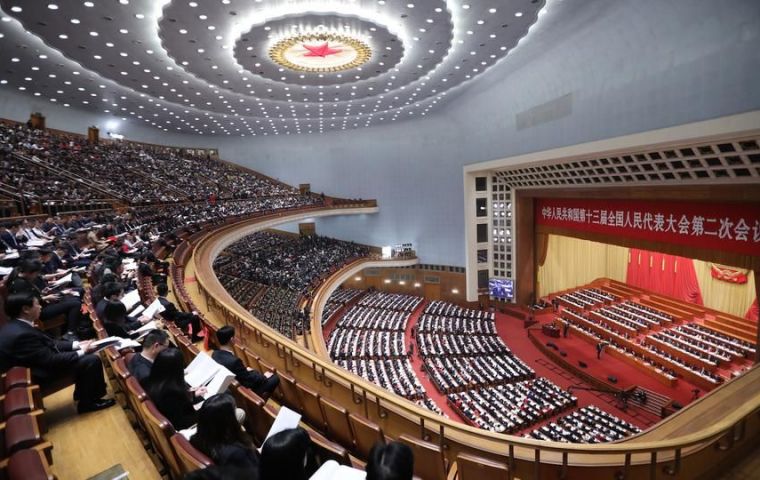MercoPress. South Atlantic News Agency
China approves foreign investment law hopefully to improve relations with US
 The National People's Congress voted 2,929 in favor of the law, barely three months after a first draft was debated
The National People's Congress voted 2,929 in favor of the law, barely three months after a first draft was debated China's rubber-stamp parliament approved a foreign investment law on Friday that was fast-tracked and may serve as an olive branch in trade talks with the United States. The legislation aims to address long-running grievances from foreign businesses, but the US and European chambers of commerce have voiced concerns that they were not given enough time to give their input.
The National People's Congress voted 2,929 in favor of the law - with eight against and eight abstentions - barely three months after a first draft was debated, an unusually quick turnaround for the legislature, which meets once a year.
The move comes as US and Chinese negotiators have held complex talks aimed at resolving a months-long trade war that has pounded businesses with tariffs on US$360 billion in two-way commerce.
US President Donald Trump said Thursday the negotiations should wrap up within four weeks, adding: “We are getting what we have to get.”
China's top trade negotiator, Liu He, held phone talks with US Treasury Secretary Steven Mnuchin and US Trade Representative Robert Lighthizer, with the official Xinhua news agency saying they made “substantial progress”.
The bill will eliminate the requirement for foreign enterprises to transfer proprietary technology to Chinese joint-venture partners and protect against “illegal government interference” - major sticking points in the trade negotiations.
It also promises to abolish the “case-by-case approvals” process for foreign investments, officials say.
The changes will ensure that foreign investors will enjoy the same privileges as Chinese companies in most sectors, except those placed on a “negative list”.
Beijing uses negative lists to identify areas that are either off-limits to non-state businesses or that require them to go through an application and approval process.
The American Chamber of Commerce in China said in a statement this week that it “welcomes and appreciates this legislative effort to improve the foreign investment climate”.
But it added that it was concerned that “such an important and potentially far-reaching piece of legislation will be enacted without extensive consultation and input from industry stakeholders”.
The provisions in the legislation were “quite general” and failed to address a number of concerns from foreign firms, including “the potential for unequal treatment” of businesses and the “broad scope” of national security reviews, the chamber said.




Top Comments
Disclaimer & comment rulesCommenting for this story is now closed.
If you have a Facebook account, become a fan and comment on our Facebook Page!